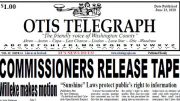By Jeffrey A. Roberts
CFOIC Executive Director
Case law and the Colorado Rules of Civil Procedure require a private judge to lift a suppression order that makes an entire divorce case file and the order itself off-limits to the public, the president of the Colorado Freedom of Information Coalition argued in a hearing Monday.
“This is not arbitration. This is not mediation. We are sitting in the district court … and every case litigated in this court is presumptively open,” said Steve Zansberg, a First Amendment and media attorney who had led CFOIC’s board since 2014.
“That is the state of the law,” he told former Denver District Court Judge William Meyer of the Judicial Arbiter Group. “This is the United States of America … and the public is entitled to enter every courtroom in the city and county building and to inspect the court files — all records on file in every one of those cases.”

Meyer is considering CFOIC’s motion to open the case file of Kaufmann v. Kaufmann with only “truly sensitive” information redacted.
The divorce is one of many being litigated outside of public view in a special Colorado judicial system that is mostly available only to “the rich, famous and well-to-do,” according to a Denver Gazette investigative series last April. Private judges hired to handle divorce cases under this system “suppress them from public view at far greater rates than in cases that rely on district court judges, leaving some legal experts wondering whether affluent clients are simply buying their way into secrecy,” the newspaper reported.
In Kaufmann v. Kaufmann, even the register of actions is unavailable to the public, according to the state judicial department’s Integrated Colorado Courts E-Filing System (ICCES).
Steven Kaufmann, a deputy in the Colorado Attorney General’s office, is fighting the unsealing of records in his case. But Alexis Denny Kaufmann did not object to CFOIC’s motion to have the suppression order set aside, asking in a court filing only that her personal medical information be protected “in the least restrictive manner and as supported by law.”
Michael DiManna, Steven Kaufmann’s attorney, said during Monday’s hearing he is “somewhat suspicious” of CFOIC’s motive and its argument that there is a public interest in lifting the suppression order. “The reason I say that is for over a year, the case remained filed in the court and it was fully open to the public for inspection. Any member of the public, including Colorado Freedom of Information Coalition, could have come and looked at the file, looked at the pleadings, looked at the discovery which had been made up to that date.”
The judge suppressed the court file in October 2022, DiManna said, after it became apparent that Alexis Denny Kaufmann “intended to do extensive discovery regarding not only the financial assets of the parties, but also of third parties, and in some cases, of people that were not even parties to this action.”
“The court did what the court needed to do, and that is to make a determination as to whether or not the harm to the privacy of the parties outweighs the public interest in this matter,” he added. “What is the public interest in this matter? I don’t find it anywhere.”
CFOIC filed a motion to intervene in Kaufmann v. Kauffmann last spring after learning about the private court system from journalist David Migoya’s stories in The Denver Gazette. A private judge, according to the newspaper, “is one that had previously served as a full-time jurist and is appointed to the position by the state’s Supreme Court chief justice after they retire.”
Zansberg said DiManna may not “see any public interest in having the public assert its rights to inspect court records, and he’s entitled to his opinion, but it has no weight here whatsoever.” What matters, he added, is the section of the Colorado Rules of Civil Procedure that says, “An order limiting access shall not be granted except upon a finding that the harm to the privacy of a person in interest outweighs the public interest.”
The Court of Appeals held in 1994 “that that the public is entitled, presumptively, to see everything in a domestic relations case, including the financial affidavits of the parties,” Zansberg also told Meyer. “And that case alone commands that everything in this court file, other than truly personal and highly confidential information, must be disclosed. That case alone is the only case the court needs to read to decide this matter.”
Zansberg also referred Meyer to an unpublished 2023 opinion in which the Court of Appeals held that only privacy interests of the parties may serve as the grounds for denying the public’s presumptive right of access to court records under C.R.C.P. 121(c) §1-5. “[T]he relevant public interest here is not the public’s interest in the substance of the specific court files protected by the seal. Instead, it is the public’s interest in the accessibility of court files in general,” the opinion says.
Meyer said he would issue an order “when I get a chance.”
Follow the Colorado Freedom of Information Coalition on X or BlueSky. Like CFOIC’s Facebook page. Do you appreciate the information and resources provided by CFOIC? Please consider making a tax-deductible donation.




